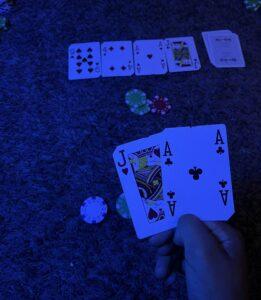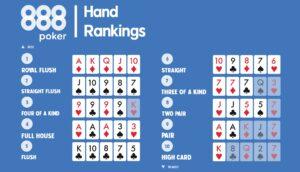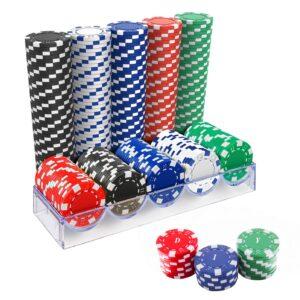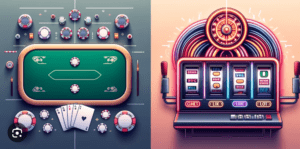Over the weekend, I played Poker with a small group of three friends. As an analog game widely played worldwide, I could not find a traceable “developer” or origin, with some claiming it was inspired by the French game Poque in the 19th century. As a game that is largely associated with gambling, I would not recommend this game to children or anybody with a gambling addiction. I played this game in a controlled setting and did not place bets with any physical money; one of my friends had poker chips, which we used to keep track of currency.

Figure 1: A snippet of the poker setup in the room we played in
After playing five games, I had pretty much… the entire pot. Despite never having played before. How did this happen? Although Poker does have some aspects of skill with bluffing and maintaining a poker space, my hands were just too good. In one round, I had double aces. In another round, I had a joker (which my small group determined was “any card of my choosing”), which I paired with a drawn ace. Although I had virtually no skill at maintaining a straight face or calling out somebody else’s (only one of my friends out of the three of us had played somewhat regularly), I could still peruse the rankings of different combinations and determine whether my hand was playable.

Figure 2: A picture of hand rankings that I constantly referred to during my play experience (Source: 888Poker)
After a small winning streak, my group joked that I was cheating and called out my bluff of confidence after I was on a winning streak already. Similarly to what was observed in the “Addiction by Design” piece, the other players seemed to have a false notion of “randomness” and connected my premature win streak with bad luck in the future. But this is just a taste of what I perceived about the addiction this game could cause. I argue that the randomness in this game evokes a lot of the same addictive consequences of playing slot machines: there are feelings of “near misses” and loss chasing, which, when combined with the unpredictability of acquiring good hands, creates addictive behavior.

Figure 3: An image of poker chips, which may act as a substitute or representation of physical cash value (Source: CUNHUY on Amazon)
Poker is deeply rooted in the unpredictability of card draws. Although this randomness can make the game exciting and engaging, it introduces the risk of addictive behaviors similar to those mentioned in “Addiction by Design.” The unpredictability of winning hands and the concept of “near misses”—despite the game (technically) being pre-decided by RNG of the cards stacked on the top of the deck, a player can feel like they have “almost won.” These (somewhat) frequent near misses then make winning feel extremely rewarding, especially when the amount you win equals what everyone else puts in. This creates large shifts throughout the game, making it feel eventful like it might be your turn to win after the next round.
Because of this large potential for the game to shift after just one win, another driver of the addiction experienced in Poker is also partially supported by loss chasing. In other words, when you lose a lot, you constantly play with the mindset of potentially hitting the “next big win.” When that win never happens, it can lead to a lack of focus, acting as a self-fulfilling prophecy and making future gameplay more irrational. As players continue to play to recoup their losses, they dig a deeper hole of more significant losses. This phenomenon highlights a dark side to the addictiveness of Poker, where people can play themselves out of a large sum of money, affecting their quality of life.

Figure 4: An image of a game of Poker contrasted against an image of a slot machine (Source: PrimeDope)
However, I won’t say that Poker is as mindless as pulling a mechanical lever to watch slots spin. Slot machines are full of output randomness, where the outcome is completely determined by a computer chip that decides your fate based on an obscure metric. Poker contains some aspects of input randomness—a strategy that can arise from randomness—in drawing cards: the idea of “card counting.” Although none of us at the table were skilled enough to do this, this is an honorable mention I wanted to make. Perhaps this makes the game more skill-based, creating a divide between “amateur” and “skilled” players that may incentivize some to continue playing the game to improve.
Additionally, I want to mention one limitation I experienced that dissuaded addictive behavior: our lack of betting with physical money (but maybe this was for the best). Although the poker chips did provide some sense of value/worth, the stakes were not as high (as felt by everyone playing the game). If we were working with actual money, I admit that the game would have been a lot more serious, and I bet I would have been more careful with hiding my cards, counting which cards had shown up, and folding (opting out of the round) when larger bets are placed.



